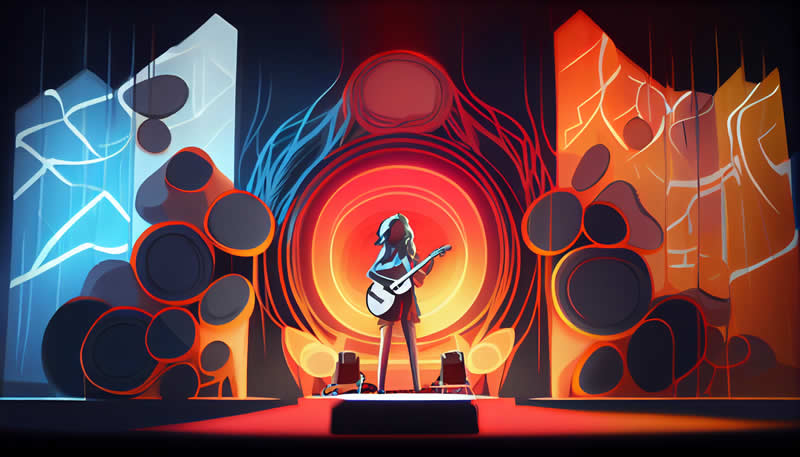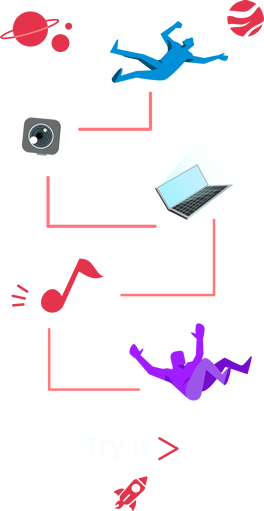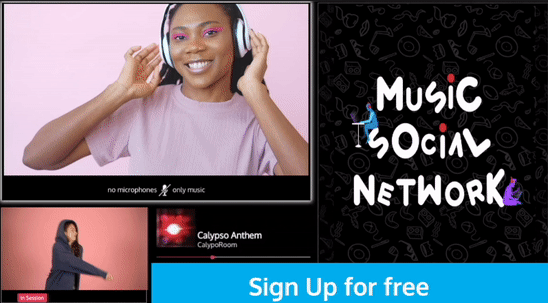Stage presence: what is it and 9 best tips to have a good one
Even if you are the most gifted artist in the world with a fantastic voice and killer lyrics, your chances of success are greatly reduced if you lack the stage presence to showcase these abilities. You must open yourself up to your listeners and let them experience your music.
If you don't have a stage presence, you won't be able to perform in front of a large audience and will end up disappearing into the background.
The good news is that even if you don't naturally have charismatic stage presence, you can pick up the tips and techniques to do so! We will discuss stage presence in this post, as well as how to improve it. Let’s dig into it.
What is stage presence, and why is it so important?
Stage presence is the key factor that determines whether someone will encourage their friends to check you out the next time you're in town or spread the good word about your performance after the concert.
The capacity to command and guide an audience's attention on stage is known as “stage presence”. This talent is demonstrated by an individual's physical presentation, body language, captivating speaking, and general behaviors.
Stage presence, when combined with talent, hard work, and experience, may make "decent" performers into stars and legends. It is crucial because it makes it fun to see you perform.
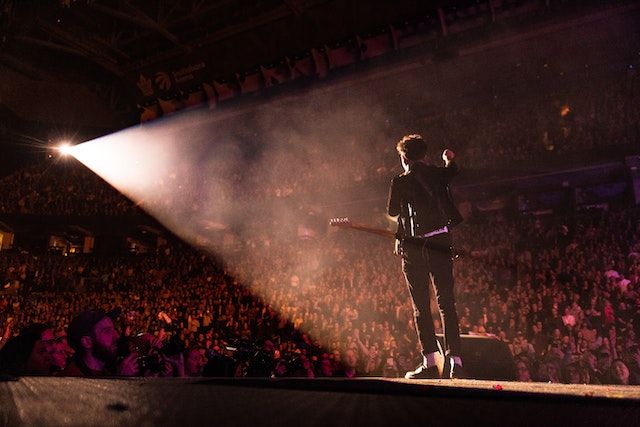
How to have good stage presence
Be aware of your posture and body language
You should speak or sing loudly, stand up straight, and make eye contact with your audience. Stand with your legs at least shoulder width apart, if not further apart, with your shoulders back and down, your head held high, and your chest out.
Don't screw around. Never cross your arms. Don't take a seat. Anything that you observe other people doing when they're uneasy, tense, or self-conscious is something you should avoid at all costs.
All of this exudes power and assurance. And without those two qualities, no one will even want to look at you for more than a few minutes. You need to be the dominant one in the space who commands attention.
Mind your outfit

If you're doing an acoustic concert at a neighborhood coffee shop, jeans and a sweater could be the ideal outfit, but while you're on stage, pay close attention to your audience and the setting. Create a look or a style that both expresses your personality and your music by consulting with your bandmates.
The most crucial thing is that you should like wearing whatever you choose. You won't put on a stellar performance if wearing tight clothing makes you nervous!
Moreover, shoes. Put on stylish shoes that go with your clothing. They stand out a lot more while you're performing on stage than they do in other circumstances. If necessary, go out and get a new pair just for your performances.
Utilize the whole stage
Even though the stage has a limited amount of space, you can use it all. It will appear quite stiff and stale to stand still in one place for the entire event. Get up, walk around, and interact with the front-row audience and your bandmates.
It could be a little bit more difficult to walk around if you're standing behind an instrument, like the piano or drums. However, if a bandmate sings or plays a more portable instrument, ask them to move around the whole stage.
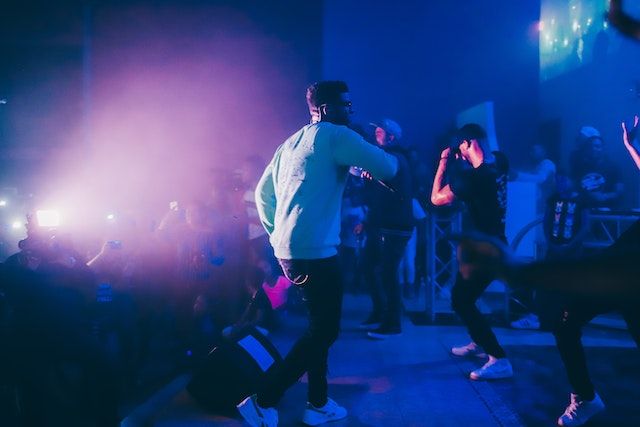
Do not stop the flow
A thrilling performance depends heavily on energy and a well-paced flow. Allowing extended silences or pauses is a major show-stopper. It’s normal that you might need a drink in between songs or that someone might need to change instruments and take a rest, but remember: it's crucial to keep the energy up!
It will be helpful to have a modest number of jokes or some brief conversation on hand to keep the audience engaged. Play a few power chords for entertainment, make fun of a bandmate, or point out a funny sign in the audience, for example.
Naturally, you can also tell stories. Things that have occurred to you while on tour that are humorous or intriguing are ideal. You can explain the background of some of your songs, the significance of the lyrics, etc.
Record all your performances

On stage, a lot might happen so quickly that you can miss some of it or have trouble recalling what you said in between sets. Watching these games again is similar to a sports team reviewing previous games.You may learn a lot about yourself just by watching yourself!
While keeping an eye on yourself, you should also be observing how the audience is responding. What did they enjoy or dislike? When did you begin to lose their interest? How are the song changes coming along?
Discover your strengths by keeping an eye out for them so you can use them. Discover your weaknesses so that you can either strengthen or avoid them.
Get to know your audience
A big element of establishing stage presence is knowing your audience. The more you understand them, the more effectively you can adjust your performance to fit their expectations.
Remember your genre and the environment. What feelings are you trying to evoke? What emotions do you want the audience to have when they leave?
This will give you a general idea of what to anticipate. They simply come to be entertained and have fun, so make sure you're doing the same.
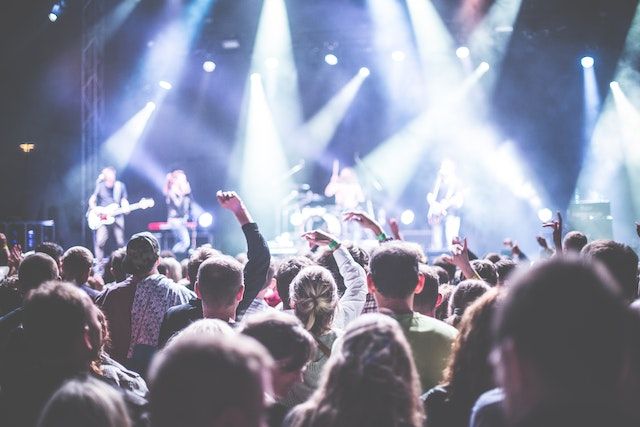
Connect with the audience during your performance
You must figure out how to make your performance seem like a team effort. Simple actions include getting the audience to clap along to specific tunes. Other times, you might encourage the crowd to sing a basic chorus by holding out the microphone to them.
Invite a big fan on stage to sing a song if they are familiar with the words. You can talk about the crowd's enthusiasm between songs, the city's kindness and beauty, etc.
Although there are many great things you can do on stage to engage the audience, creativity is still required. Think of the entire room as "us," rather than "there's me and then there's the crowd," and elevate the energy by tuning in to it.
Be yourself
To start, you must understand who you are and what makes you special. Once you realize this, you can imagine a dream version of yourself, but it must still correspond to reality. To be genuine, anything must appear natural; otherwise, people would recognize a fake.
List 5-10 qualities about yourself that you find appealing or distinctive. Once you've got some ideas down on paper, work out how to incorporate them into your stage presence. The most crucial thing to keep in mind is to be true to yourself! Enjoy yourself and be yourself.

Practice a lot
Play your instrument while standing up, like you would on stage, get some practice speaking to the audience in front of a mirror, and do some study on the kind of performance you would like to witness from yourself. All of these actions will boost your confidence and stage presence significantly.
How to improve your stage presence - Conclusion
Everyone already has some degree of stage presence; the challenge is developing it so that it not only doesn't suck but also catapults your career forward. Making sure others like being around you when you are the focus of attention is the true objective.
If you liked this post and would want to read more tips for your music career and general information about the music industry, please visit our blog section.
You're here because you love music, so please try to listen to it together with your friends or strangers, at the same time, connected by webcam in CalypsoRoom.
In CalypsoRoom we believe music is the most powerful tool to bring people together, and for this reason, we developed an online music social network where you can connect with friends or strangers while listening to music simultaneously, connected via webcam.
Are you a music artist or label and do you want to give your music a further dimension? Do you own or co-own the master and publishing rights to your music? If yes, consider to post it on CalypsoRoom: it’s free, you keep 100% of your copyright, you promote your music in a new way, and you get a new revenue stream! Check it out.
Thanks for reading,
CalypsoRoom Team
back
Written by CalypsoRoom Editorial Team
The CalypsoRoom Editorial Team is a skilled and diverse group of writers, researchers, and industry specialists who have access to Calypso's data and information in order to give you broad knowledge about the music industry as well as helpful advice to help you manage your music and dancing career.
Updated January 2023
Company number: 681223
James's Walk 31, Dublin, Ireland
contact@calypsoroom.com
+353 (89) 435 8928

